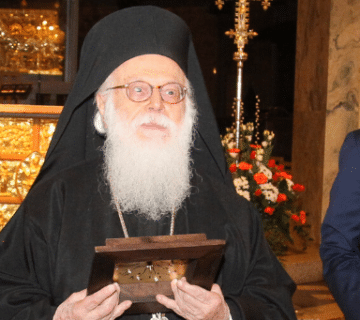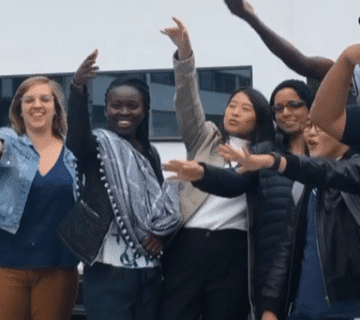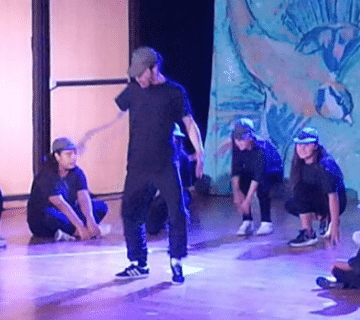Forty-two members of the Rissho Kosei-kai, a Japanese lay Buddhist renewal movement, from Hiroshima and neighbouring towns, visited Poland. They were welcomed by members of the Focolare Movement in Cracow.
They then proceeded to Rome where they participated in the Mass of the Holy Father. Following this, they visited the Mariapolis Centre at Castelgandolfo on 12 June. After a brief introduction, they saw a video of the WCRP Assembly in Amman which had been dubbed for them in Japanese.
They shared their experiences of how they try to live for others because, as the Lotus Sutra says: “If our heart is one with the Will of God Buddha, around us thousands of other hearts will be born”. This was followed by the experience of a family of the Focolare Movement.
At the end of the meeting, the head of the Buddhist delegation said that what they were taking away with them as a precious treasure was the “art of loving”.
He recalled the first meeting, 21 years ago, of Chiara Lubich with Nikkyo Niwano, their founder, which generated a profound spiritual communion between the two movements. He added that he was convinced that that meeting was in the plans of God Buddha to build a world of peace.
Before leaving, everyone made a pact to always live in unity, as one heart.
In Sri Lanka, with Buddhists monks and dignitaries of very high social, political and religious standing
The Reverend Sirisuma Saddhatissa Dhammarakita, 85 years old, governs 58 Buddhist monasteries of Sri Lanka. After having listened to one of the Focolare Movement directors explaining how we try to put into practice the “art of loving”, he commented: “This spirit of love is what Buddha always preached. You are a Christian. Can we see a Buddhist, preferably a monk, who lives in this way?”
And he invited the monk Thongrattana Thavorn, from Thailand, who knows the Movement from many years.
Arrived from Bangkok, the monk, accompanied by two ‘focolarini’, had important meetings with monks, civic personalities, buddhist lay people.
In the terrible situation of civil war, Rev. Thongrattana Thavorn spoke of peace and harmony among religions and races, eloquently recounting his own experience in contact with the Movement.
He also met with some Hindus Tamil.
During the conversation with Prof. Aryaratne, a very high buddhist personality in social, politic and religious world of Sri Lanka, the deepest cords of these two souls, committed to the dialogue with other religions, were moved.
We can say that the spirituality of the Movement helped monks from two countries of Therawada Buddhism, but who were currently very distant from one another, to rediscover their common roots.
The Nichiren-shu
At the end of June, another important meeting with a delegation of 60 Buddhists, including monks and lay people, took place at the Mariapolis Centre in Castelgandolfo.
They belonged to the Nichiren Shu, one of the more traditional schools of Japanese Buddhism, and had just attended “International Forum 2000” in Hanover, Germany, on the occasion of Expo 2000.
They were accompanied by the Archbishop of Osaka, Mons. Leo Ikenaga, and by
Rev. Ryusho Kobayashi of the Tendai Shu, another Japanese Buddhist group.
They listened to the story of the Focolare Movement and received an updating on the most recent developments, particularly on the convention of the Movement for Unity in Politics which had concluded on 11 June.
The leader of the group, speaking on behalf of everyone, said that they had the impression of finding the world centre of interreligious dialogue right there in Castelgandolfo. They too want to be part of this dialogue as is the Tendai Shu group which has taken giant strides in this area.
“There are many pathways which lead to the summit. There all religions find peace with one another.”
Rev. Kobayashi of the Tendai Shu, who was so happy to be with us again, said: “The Focolare Movement has also spread in the Buddhist world. Its way of living for others is synonymous with the Buddhist way of putting into practice the spirit of Bodhisattva and here we have a lot to learn in transmitting it to our young people.”
Mons. Ikenaga of Osaka said that for him this trip he had undertaken with the Buddhists had been an extraordinary experience because for the world to move in the right direction towards peace there was a need for interreligious collaboration.
Rev. Takeuchi, from the Nichiren Shu, concluded: “Here, in front of the leaders of the Focolare Movement, I wish to say something. Our founder, Nichire, 750 years ago, had tried to unite the schools of Buddhism through dialogue, and he was persecuted for doing so. (…) Meeting the Focolare I understood that in the twenty-first century dialogue must be lived. For both Christians and Buddhists, the prime enemy is modern rationalism. In order to combat this we have to find an alternative theory and this isn’t possible without collaboration.”


 Italiano
Italiano Español
Español Français
Français Português
Português


